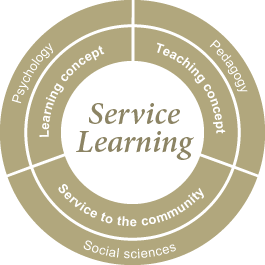Research on service learning
In order to promote a better understanding of the prerequisites for and effects of service learning and more effectively implement it, service learning itself has become the subject of scientific investigation. Service learning has its roots in experience-based, action-oriented learning and education in democracy. Aside from being a learning and teaching concept, service learning is also a form of civic engagement. For all those involved – students, faculty, the university, non-profit organizations and the community – and beyond, service learning offers a multitude of opportunities, which, amongst others, touch upon the following subject areas.
- the theory of learning
- self-concept
- life-long learning
- informal learning processes
- university didactics
- education in democracy
- university development
- cooperation management
- the social economy
- civil society
- civic engagement
Currently available research on how students benefit from service learning has focused on how it broadens their knowledge and competence and fosters their personal growth. However, the current status of research leaves essential questions unanswered with regard to the implementation and application of service learning.
The service learning idea currently primarily emphasizes the positive results of this learning and teaching concept. Empirical research should, however, take the starting and framework conditions into account, the methods of implementation as well as the effects of service learning – at the individual level, at the level of the participating institutions as well as the overall social perspective. It is absolutely mandatory that such empirical research be supported by a theoretical framework.
For example, the following issues should be addressed, which are of relevance for different scientific disciplines
- what non-profit organizations and beneficiaries of service learning activities expect from service learning, how they deal with it and how they assess it
- how service learning impacts the scope and efficiency of non-profit organizations as well as their institutions and services
- how service learning effects the personal biographies of the participating students
- how service learning activities differ from traditional engagement
- how to assess the potential effects on civil society as well as the limitations of what service learning can accomplish
- what kind of institutional requirements universities need to fulfill in order to implement service learning and integrate it into their curriculum
- how to establish a theoretical foundation for student learning processes (at the emotional, cognitive and the behavioral level)
- how to evaluate the concept, structure and implementation of service learning at universities
- how to develop standardized evaluation tools


